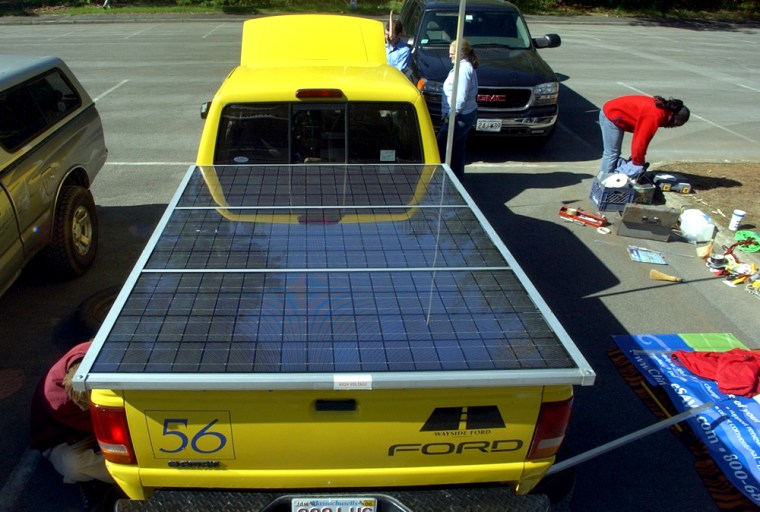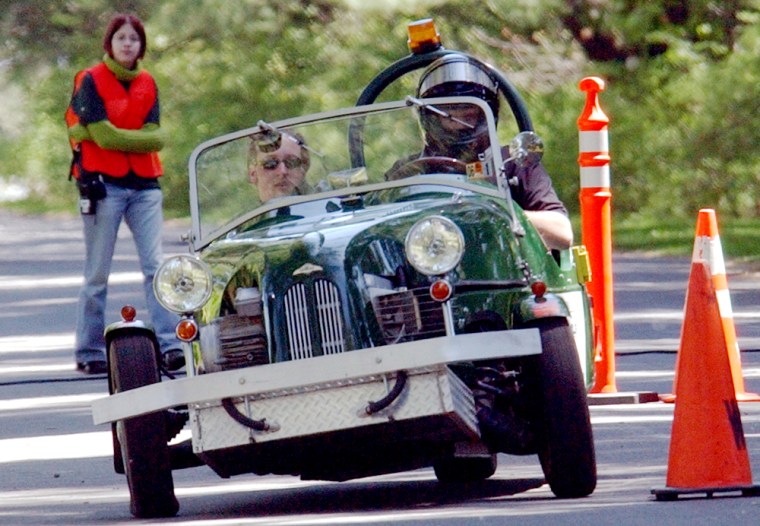Peek under the hood of Ken Wells’ pickup and you’ll see 24 golf cart batteries stacked where the V6 engine usually sits. The bed of his bright yellow Ford Ranger 4X4 is bridged with solar panels.
The truck, modified by the high school physics teacher and his students, is part of a fleet of vehicles powered by the likes of vegetable matter, natural gas and the sun.
The cars converged in upstate New York recently for the 17th annual Tour de Sol, a competition and car show that brought together green-minded grease monkeys and corporate types interested in creating cars that run cleaner and better than gasoline-only models.
While these alt-fuel enthusiasts were sometimes dismissed as fringe-types or killjoys during the SUV-dominated ’90s, participants say more people are paying attention in an era of $2.24 gallons of gas.
Driven by 'economic realities'
“I think the economic realities are going to drive us to using the most efficient technologies we can,” said Wells, who teaches at a boarding school near Boston.
The tour was organized by the Northeast Sustainable Energy Association, a Massachusetts-based advocacy group.

Vehicles that took part included hybrid cars now on the highway, retrofitted vehicles such as Wells’ truck, and bubbly looking models that could pass for George Jetson’s ride. One particularly futuristic-looking car created by students at the Vehicle Research Institute at Western Washington University had a streamlined carbon-fiber body and ran on compressed natural gas. Another electric vehicle looked like a sporty European roller-skate.
Though cars competing in efficiency and handling competitions are registered for road use, there are still hurdles keeping many from wider use just yet.
For instance, Wells gets only a fraction of the power for his truck from the bed of solar panels. He plugs in for most of his energy. And if he needs to go more than 100 miles, he needs to find an electric outlet en route.
Hybrid cars such as the Toyota Prius get around the range problem by relying on gas and electric power; the battery is charged during normal driving. Advocates at the tour believe future hybrids will be less dependent on gasoline as batteries become more powerful.
Some wary of hydrogen
Oddly, the alt-fuel crowd seems less enamored of the high-profile solution being backed by Detroit and the Bush administration: the fuel cell.
Cars running on fuel cells that produce energy by mixing hydrogen with oxygen are already on the road and President Bush has pushed a $1.7 billion hydrogen research program. Administration officials have said it’s possible fuel cell cars will be mass marketed in 15 years.
While fuel cells cars are indeed clean and green — their byproduct is water — some activists argue that it’s inefficient to manufacture hydrogen and then deliver it through a network of roadside stations.
Eron Shosteck of the Alliance of Automobile Manufacturers said while there are fuel cell challenges, the auto industry is spending billions to meet them. Fuel cells are coming, he said: “The only question is when, not if.”
One of the safest bets, supported by industry analysts, is that hybrid cars will continue to make inroads. Encouraged by the hot-selling Prius, automakers are expected to increase their hybrid offerings in the coming years
Mark Bunger, principal analyst for Forrester Automotive, said that hybrid cars — either gasoline/electric or gasoline/hydrogen — will win because consumers will naturally gravitate to cars that give them lots of options.
“At some point, we’re going to look at the gasoline engine the same way we look at hand cranking our cars to start them,” Bunger said. “It just won’t be done.”
